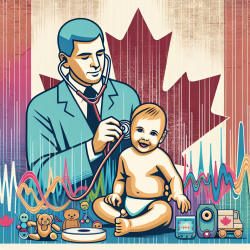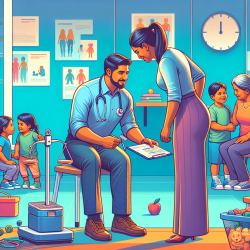Introduction
As professionals dedicated to improving the health and well-being of children, it is crucial to stay informed about the latest research and its implications for practice. The research article "Women and Children First: The Impact of Sexually Transmitted Infections on Maternal and Child Health" provides valuable insights into the challenges and solutions related to sexually transmitted infections (STIs) and their impact on maternal and child health. This blog will explore how practitioners can enhance their skills by implementing the outcomes of this research and encourage further investigation into this critical area.
The Impact of STIs on Maternal and Child Health
STIs pose a significant threat to maternal and child health, particularly in low- and middle-income countries where over 75% of STIs occur. The research highlights that women, especially adolescents, are particularly vulnerable to STIs due to biological, social, and cultural factors. These infections can lead to severe health outcomes for mothers and their children, including increased risk of HIV transmission, congenital syphilis, and other complications.
The research emphasizes the importance of addressing the root causes of STI vulnerability, such as poverty, neglect, and inequality. Practitioners can play a vital role in mitigating these risks by adopting a holistic approach to care that considers the social determinants of health and advocates for systemic changes.
Implementing Research Outcomes in Practice
To enhance practitioner skills and improve outcomes for mothers and children, consider the following strategies:
- Promote Comprehensive Sexual Education: Educate adolescents and young adults about safe sexual practices and the importance of regular STI screenings. Empower them with knowledge to make informed decisions about their sexual health.
- Integrate STI Screening in Routine Care: Encourage routine STI screening for pregnant women and their partners. Early detection and treatment can prevent mother-to-child transmission and improve maternal health outcomes.
- Advocate for Accessible Healthcare Services: Work towards improving access to healthcare services, particularly in underserved communities. This includes advocating for affordable STI testing and treatment options.
- Utilize Data-Driven Approaches: Use data to identify high-risk populations and tailor interventions accordingly. Data-driven decision-making can enhance the effectiveness of prevention and treatment strategies.
Encouraging Further Research
The research underscores the need for continued investigation into innovative solutions for STI prevention and treatment. Practitioners can contribute to this effort by:
- Participating in Research Studies: Engage in research initiatives that aim to develop new interventions and evaluate their effectiveness in diverse populations.
- Collaborating with Multidisciplinary Teams: Work with researchers, policymakers, and community organizations to develop comprehensive strategies that address the multifaceted nature of STIs.
- Sharing Best Practices: Disseminate successful interventions and programs within professional networks to promote evidence-based practices.
Conclusion
The research article "Women and Children First: The Impact of Sexually Transmitted Infections on Maternal and Child Health" provides a compelling call to action for practitioners to enhance their skills and contribute to the global effort to combat STIs. By implementing research outcomes and engaging in further research, practitioners can make a significant impact on the health and well-being of mothers and children worldwide.
To read the original research paper, please follow this link: Women and Children First: The Impact of Sexually Transmitted Infections on Maternal and Child Health.










